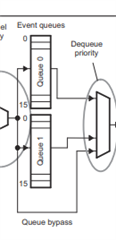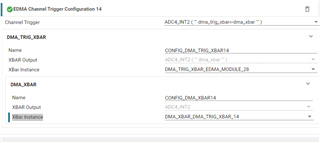Other Parts Discussed in Thread: SYSCONFIG
Tool/software:
MCU-PLUS-SDK-AM263X: Continuous sampling of multiple ADCs to DMA buffers
I want to configure multiple ADC channels to continuously read voltage and store the samples to RAM using DMA.
Referring to SDK example: adc_soc_continuous_dma
I have this example working, but the SDK example fills the DMA buffers, and then stops.
I want to modify example such that ADC conversion is continuous for defined number of samples.
I experimented removing the function calls in the ISRs (seen here) which I suspected may be stopping the 'continuous ADC to DMA' that I want.





